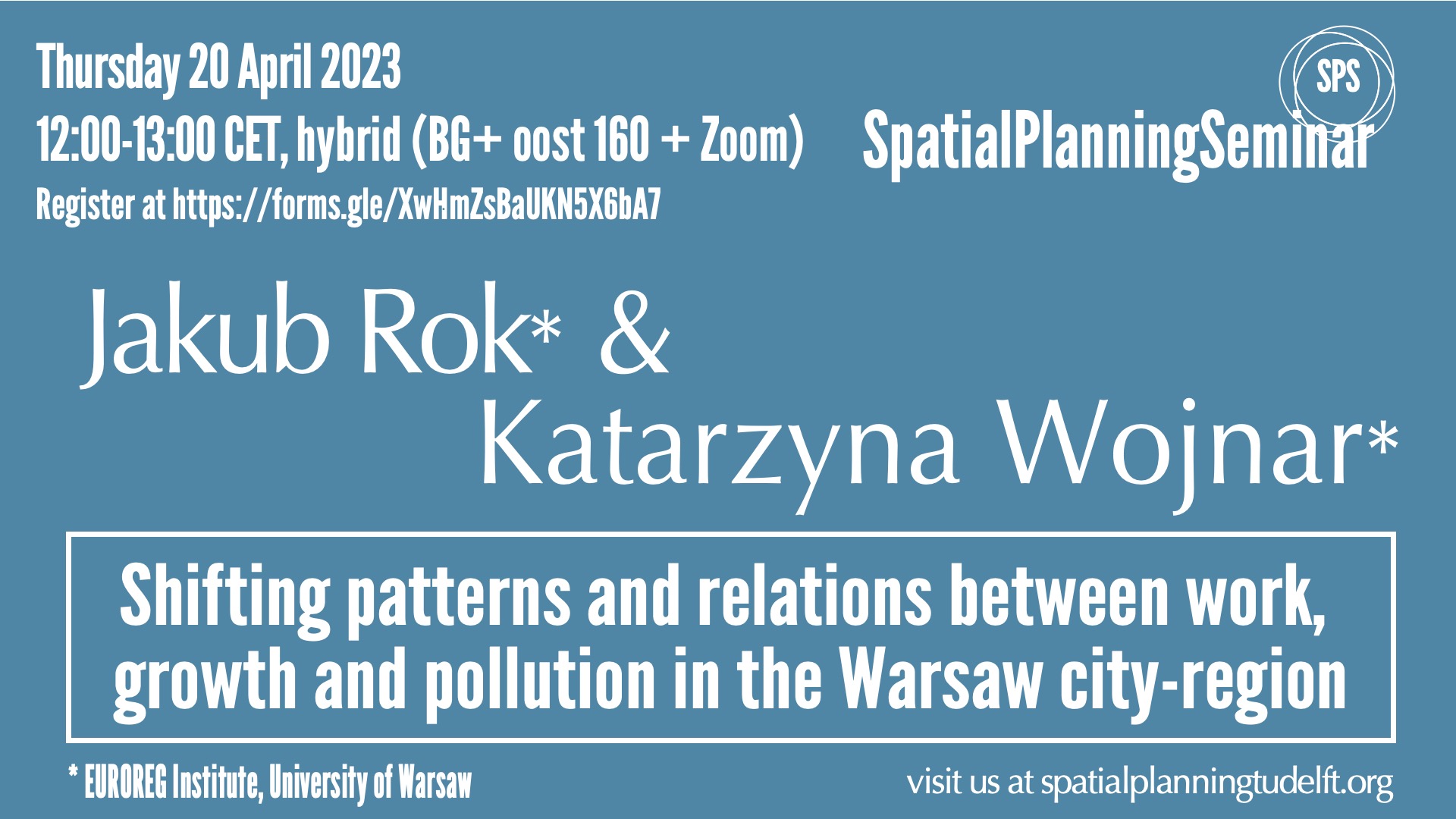
On the 20th of April at 12:00-13:00 CET we will host a hybrid SPS seminar entitled ‘Shifting patterns and relations between work, growth and pollution in the Warsaw city-region’. The speakers are Jakub Rok & Katarzyna Wojnar, both hailing from the EUROREG institute.
Here are the abstracts of their talks and bios.
The Environmental Kuznets Curve inside a city region. What is the role of suburbanization in decoupling air pollution from growing income?
Dr Jakub Rok, EUROREG, University of Warsaw
Abstract
Air pollution is purported to drive migration from cities to the suburbs, fueling urban sprawl. We aim to explore the relationship between pollution and economic development in the spatial framework of a suburbanizing city region using the example of Warsaw, Poland. To account for spatial dependence in data, we apply the Spatial Lag model to estimate the effect of local GDP on PM2.5 concentration levels in 314 municipalities. We find evidence for the decoupling of local GDP and air pollution, lending support to the Environmental Kuznets Curve (EKC) hypothesis. Next, we verify the role of air pollution in explaining the subsequent change in average personal income. The indirect effect of pollution turns out to be especially important, suggesting that the high environmental quality of municipalities located close to polluted urban centres facilitate such migrations. The decoupling observed at the city region level is partially driven by the in-migration of relatively wealthy urbanites to these suburban municipalities. In order to prevent the worsening of environmental quality at the regional level, policymakers should take into account the spatial dependence of air pollution and the spatial heterogeneity of its relation with development in order to effectively reduce incentives for suburbanization.
Jakub Rok holds a PhD in Ecological economics and MA in Regional development. He is an assistant professor at the Centre for European Regional and Local Studies EUROREG, University of Warsaw. His doctoral thesis examined the socio-environmental costs of development using urban air pollution as an example. He has more than 10 years of experience in interdisciplinary research on local sustainable development, policy evaluation and ecological economics. He has been coordinating the first university course on degrowth and environmental justice in Poland. In 2019 he was a visiting scholar (PhD student) at Utrecht University. Currently, he works on the topic of urban environmental justice, and the political economy of natural resources.
Business hub or social club? Resilience and spatial differentiation of coworking spaces in the city. Evidence from Warsaw
Dr Katarzyna Wojnar, EUROREG, University of Warsaw
Abstract
The COVID-19 pandemic was a testing ground for the coworking space understood as a concept that became popular as a result of the 2008 financial crisis. It raised questions regarding the resilience of coworking spaces (CWS), the dynamics of evolution of their business models and, in consequence, the impact of these new workspaces on the city. The main aim of the paper was to investigate whether the evolution of coworking spaces is shifting towards the ‘social club’ model or the ‘business hub’ model, and which of these two models proved to be more resilient in the time of the pandemic. In addition, special attention was paid to how the location in the city space contributed to such resilience. The analysis draws upon the longitudinal research of all the coworking spaces carried out in Warsaw between 2008 and 2021, semi-structured interviews with real estate market stakeholders and city authorities, as well as structured covert participant observations. Our findings show that the evolution of coworking spaces is shifting towards the corporate ‘business hub’ rather than the bottom-up ‘social club’ model, and that there is a clear differentiation in the location preferences of different types of coworking spaces. Moreover, ‘business hubs’ showed more resilience, and the development of CWSs throughout the pandemic clearly strengthened the position of the Central Business District (CBD) in relation to other business areas and the rest of the city.
Katarzyna Wojnar – PhD in Earth Sciences and Geography works as an assistant professor at the Centre for European Regional and Local Studies at EUROREG, University of Warsaw. She is an expert in urban creativity and culture policies. Her current research interests involve new economic spaces, in particular co-working spaces, their location patterns, location factors and spatial impacts of new working spaces at metropolitan and micro-urban scale. She has also participated in numerous research projects including EU Framework Projects, COST, ESPON, and national grants. In the years 2007-2014 she worked as a coordinator of the ESPON Polish Contact Point, which is an European Territorial Observatory Network Research Program (www.espon.eu). She is one of programme coordinators for the Urban Studies master course at the University of Warsaw.
Please register here: https://forms.gle/XwHmZsBaUKN5X6bA7
Zoom link will be provided on the day of the event.